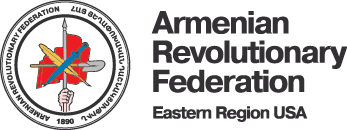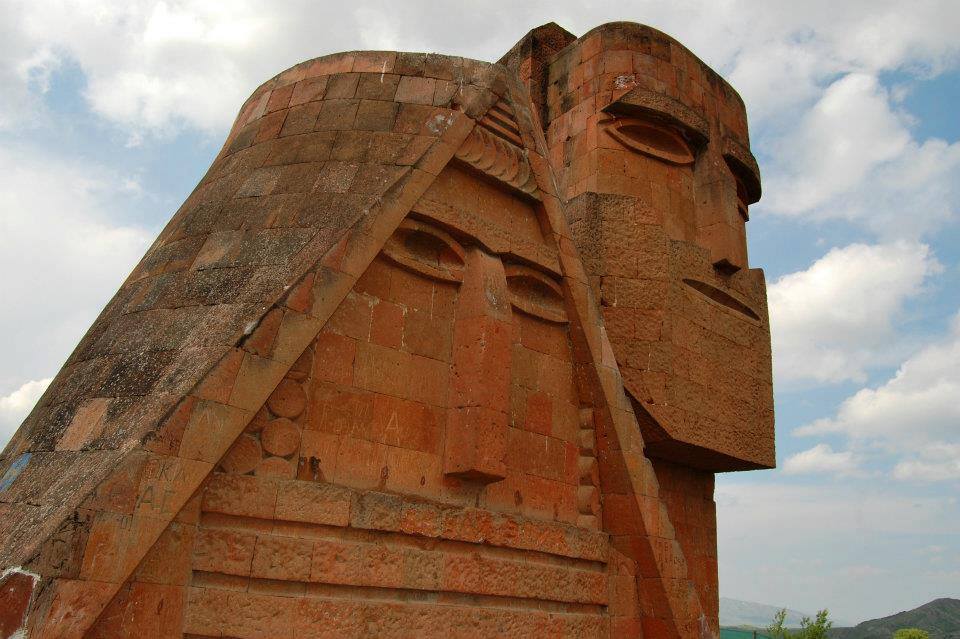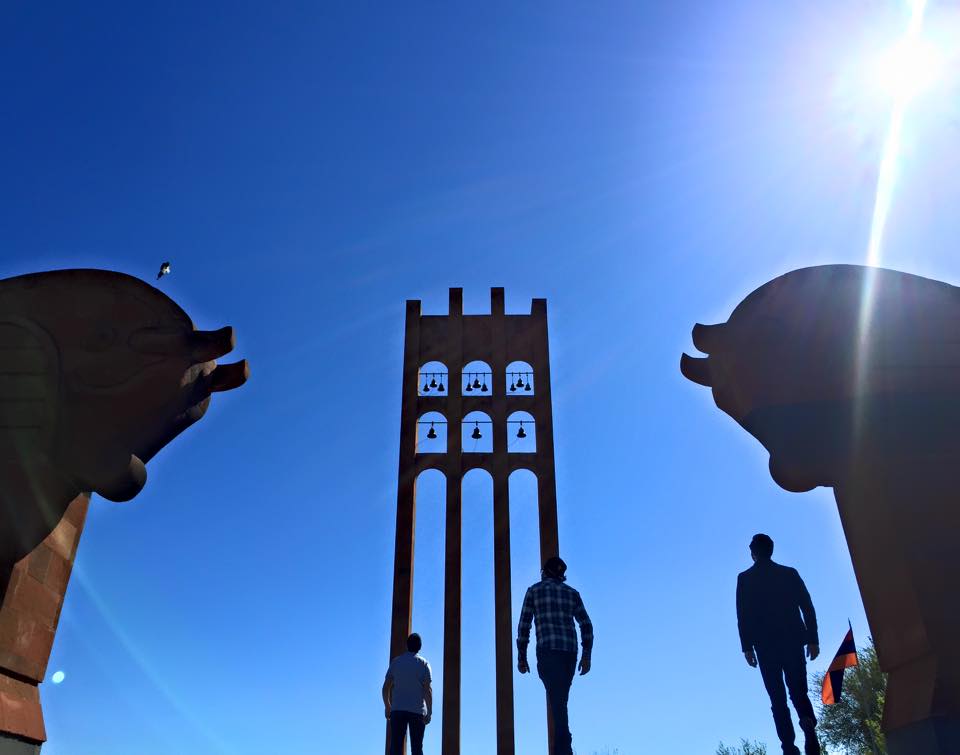Mensoian: Artsakh Is Our Nation’s 21st Century Sardarabad

The article below, authored by Armenian Weekly contributor Michael Mensoian and published on the occasion of the 24th anniversary of the Liberation of Shushi, stresses the importance of defending the independence of Artsakh. “Some of our brothers and sisters have already given their lives on the battlefield and others stand in harm’s way prepared to engage a determined enemy. Artsakh is under siege. We in the Diaspora must set our sights high and provide whatever is required to achieve ultimate victory in Artsakh and to assure Armenia’s future,” writes Mensoian.
From the Armenian Weekly 2016 Magazine
Dedicated to the Anniversary of the Armenian Genocide
The present situation along the Nagorno-Karabagh Republic (NKR/Artsakh) Line of Contact (LoC) is as critical to our nation’s survival as was the situation in the weeks leading up to our eventual victory over the Turkish army at Sardarabad in 1918. The intensification of military operations by Azerbaijan is a strategy that was made possible by the acquiescence of the United States and Chancellor Angela Merkel representing the European Union when President Recep Tayyip Erdogan was accepted as a strategic partner. In its struggle for independence, Artsakh faces both Turkey and Azerbaijan. Recall that President Erdogan has often boasted: Turkey and Azerbaijan; two countries; two flags; one people.
The Unholy Alliance
An unholy alliance connects Berlin and Washington to Ankara. Unfortunately for our legitimate aspirations, President Erdogan’s present position of power was bestowed upon him by the feckless leadership of the U.S. and Chancellor Angela Merkel when they accepted him as a strategic partner. Our ally Russian President Vladimir Putin sits on the sidelines playing both sides against the middle as he seeks to seduce Azerbaijan into the Russian orbit knowing that Armenia is firmly under his control. He forgets how his Bolshevik forebears failed in a similar attempt with Ataturk a century earlier. Who paid the price? Armenia did by having Nakhitchevan, Artsakh, and the Kars-Ardahan region gifted to their Azeri and Turkish neighbors. Hopefully Armenia will not pay the price again with the loss of Artsakh. With President Erdogan as his backbone, President Aliyev has carte blanche to use his military assets against Artsakh however and whenever he chooses.
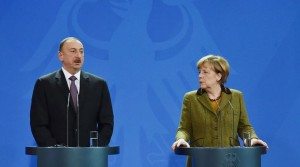
Azerbaijani President Ilham Aliyev and German Chancellor Angela Merkel (Photo: Official website of the Azerbaijani President)
To obtain President Erdogan as a strategic ally to support its vacillating policy in the region, the U.S. overlooks his abominable human rights record as well as his ongoing devastating military campaign against his Kurdish citizens. To further placate him, the U.S. does not provide the Kurdish peshmerga forces, that have proven to be effective and reliable combat fighters, with the heavy military assets they require. Strengthening President Erdogan’s hand is Turkey’s valued membership in NATO. Under the German chancellor, the EU has enhanced his power even further. In a complicated arrangement to limit the endless flow of humanity passing through Turkey seeking entry to Europe, the EU has allocated $6.7 billion for Ankara to implement the agreement. In a further capitulation to obtain his cooperation Turkey’s ascension to EU membership, which has been languishing, will be put on a fast track. In addition, visa free travel for Turkish citizens is also being considered. Given this background, should it surprise us that the very best the Minsk Group (including Putin as well who is pursuing his own agenda ) could offer in response to the full-scale attack launched against Artsakh by Azerbaijan was that both sides should refrain from escalating tensions along the LoC. With respect to the verified atrocities committed by the Azeri military against Armenian civilians and soldiers, there was more silence.
The Pro-Azeri Pre-Conditions
From the beginning (2002) when the countries represented by the Minsk Group (the EU, the U.S., and Russia) decided to seek a political solution through negotiations, Artsakh’s future independence was foreclosed by the pre-conditions necessary to achieve a negotiated settlement. They required 1) the removal of all Armenian military forces from the liberated territories (which have been labeled as “occupied territory”); 2) the right of return of displaced people (Azeris primarily, since few Armenians would elect to return to Azerbaijan); 3) a secure corridor connecting Armenia with Nagorno-Karabagh (presently a common border exists with both a northern and southern connection) together with a guaranteed corridor for Azerbaijan through southern Armenia connecting Azerbaijan with its Nakhitchevan exclave; 4) granting self-governing status to Armenians (who presently govern themselves) until such time when a 6) vote to determine the final status of Nagorno-Karabagh would take place.
During this interim period until the voting takes place, the Artsakh Defense Force would be replaced by an International Peace-keeping Force to protect the Armenians. Since political control would have been returned to Azerbaijan, President Aliyev would have free rein to reshape the demographic make-up of the region to its advantage. The voting to determine Nagorno-Karabagh’s status would be a sham. Even at its best, if local autonomy for the Karabagh Armenians were granted, it would be short-lived. Within 10 to 15 years Azerbaijan would have transformed Nagorno-Karabagh into another Nakhitchevan.
While Russia is treaty-bound to come to Armenia’s aid if attacked, we do not know if there is a secret protocol that commits it to support Artsakh under certain conditions. We must rely on the fact that a Turkish-Azerbaijani victory would weaken, if not eliminate, Russian influence in the South Caucasus even with their continued dominance of Armenia. Any display of military weakness by Russia or loss of prestige by President Putin could have serious ramifications. Assuming such a scenario, Turkey would dominate the South Caucasus and be free to expand its economic and political influence into central Asia. Although Armenia may be small, with Artsakh it occupies a strategic position that secures Russian interests in the South Caucasus and protects its southern border that extends across the Caspian Sea into Central Asia.
Azerbaijan’s Strategy
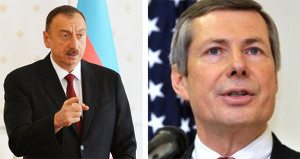
President Ilham Aliyev of Azerbaijan (L) and the US Co-Chairman of the OSCE Minsk Group James Warlick (R)
Given the almost carte blanche that President Aliyev seemingly has, a military solution to retake Artsakh evidently seems feasible to him. The explosive “blitzkrieg” type full-scale offensive launched during April 1 to 4 of this year is a tactic born of the new strategy. These “blitzkrieg” type operations seek to 1) test Artsakh’s defensive perimeter; 2) seize strategic terrain now controlled by Artsakh; 3) demoralize both the civilian population and military personnel; and 4) put pressure on Stepanakert to provide for people evacuated from villages close to the LoC (note that some 80 percent of Artsakh’s population lives within 20 miles of the LoC). These full scale attacks will continue as long as President Aliyev encounters no serious response from the Minsk Group countries. At some point, a determination will be made to launch a final full-scale attack deploying tanks, mechanized infantry, and artillery with air support along the entire LoC from Talish in the north to the Iranian border in the south. As I have indicated in previous analyses, any Azeri military offensive will have a window of opportunity of between 36 to 72 hours before concerned nations will demand a ceasefire. During this limited period, the Azeri units must breech Artsakh’s primary defensive perimeter. If successful, they will declare a ceasefire to preempt action by the Minsk Group countries. Breeching the LoC with some sectors being pushed further to the west would leave Artsakh in a vulnerable position. It would be at this stage that President Aliyev would want to negotiate.
Fortunately this is all predicated on a campaign faultlessly executed by Azerbaijan. Amassing the number of units required to simultaneously attack along the entire LoC without detection is difficult at best. Also, our defensive forces know the sectors that are most likely to bear the brunt of any full scale operation. If this is their final go-for-broke offensive, the expected staggering battlefield casualties will not be a deterrent. It is to be expected that a force attacking fortified position commanding the high ground will sustain casualties about five times greater than those suffered by the defending force. These heavy battlefield losses do affect the moral and the combat effectiveness of the attacking units. If the Artsakh defensive positions cannot be breeched within the 72-hour window of opportunity and with battlefield losses in men and equipment mounting, the Azeri high command has to think long and hard if they want to continue. With war raging nearby in Syria and Iraq and with Europe and Turkey facing turmoil, the untended consequences of a prolonged war in the South Caucasus is more than sufficient to cause concerned nations to intervene.
Our Response
The Diaspora is literally Artsakh’s last line of defense. We in the Diaspora must put aside our ideological blinders, our organizational parochialism, and our penchant to let petty differences affect our participation. Artsakh needs us today—there could very well be no tomorrow. Damaged homes and infrastructure must be repaired; the wounded must be cared for; and the children and elderly (the most vulnerable during war-time) require assistance. Artsakh’s needs are far beyond its ability to respond. There is no reason why the diasporan communities, and their organizations and institutions as well as ad hoc groups cannot work cooperatively to raise the millions of dollars in contributions and in-kind donations that is and will be needed in Artsakh for the next two to three years. If Artsakh survives this critical period, victory will be assured. If not, Armenia would forever be economically and politically subservient. Some of our brothers and sisters have already given their lives on the battlefield and others stand in harm’s way prepared to engage a determined enemy. Artsakh is under siege. We in the Diaspora must set our sights high and provide whatever is required to achieve ultimate victory in Artsakh and to assure Armenia’s future.
Source: Armenian Weekly Mid-West
